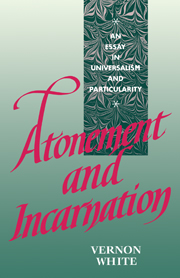Book contents
- Frontmatter
- Contents
- Introduction
- 1 The claim
- 2 On having lived too long and seen too much
- 3 The work of Christ (On trying to conceive how ‘things are not as they were’)
- 4 Two recent contributions
- 5 Creating an atonement model
- 6 The person of Christ (On trying to conceive how the Word became Flesh)
- 7 A moral demand: conditions for real reconciliation
- 8 Anthropocentricity, imperialism, and evangelism: an ethical postscript
- Notes
- Bibliography
- Index
- Frontmatter
- Contents
- Introduction
- 1 The claim
- 2 On having lived too long and seen too much
- 3 The work of Christ (On trying to conceive how ‘things are not as they were’)
- 4 Two recent contributions
- 5 Creating an atonement model
- 6 The person of Christ (On trying to conceive how the Word became Flesh)
- 7 A moral demand: conditions for real reconciliation
- 8 Anthropocentricity, imperialism, and evangelism: an ethical postscript
- Notes
- Bibliography
- Index
Summary
The universal claims of the Christian Faith are not easy to sustain. It is sufficient merely to spend some time sitting at a roadside cafe in a busy, cosmopolitan city, watching the world go by. It is a big world, with too many people. It stretches the imagination a long way to think how God could have significant personal interest in every individual. It is even more difficult to think of that interest in the highly specific terms of some traditional Christian claims. How can God be conceived as actively working to bring every individual into a personal relationship of reconciliation and love with himself, through Jesus Christ? It does not matter whether we are watching the world in Coventry or Calcutta; only a tiny fraction of the passing crowds will have the opportunity seriously to face that claim, let alone respond to it. Countless millions of human individuals, supposed to be made in the image of God and destined at least for the opportunity of this kind of ‘saving relationship’, appear to pass through time and space with nothing of the sort. Then there is also the unfathomable expanse of the universe beyond this world. How are we supposed to imagine our little local Christ event reconciling all that?
It is true that we could discuss such doubt in purely psychological terms, as some passing metaphysical vertigo, confined only to susceptible star-gazers of a certain temperament. But the hard questions it provokes cannot be dismissed so lightly.
- Type
- Chapter
- Information
- Atonement and IncarnationAn Essay in Universalism and Particularity, pp. 1 - 7Publisher: Cambridge University PressPrint publication year: 1991



